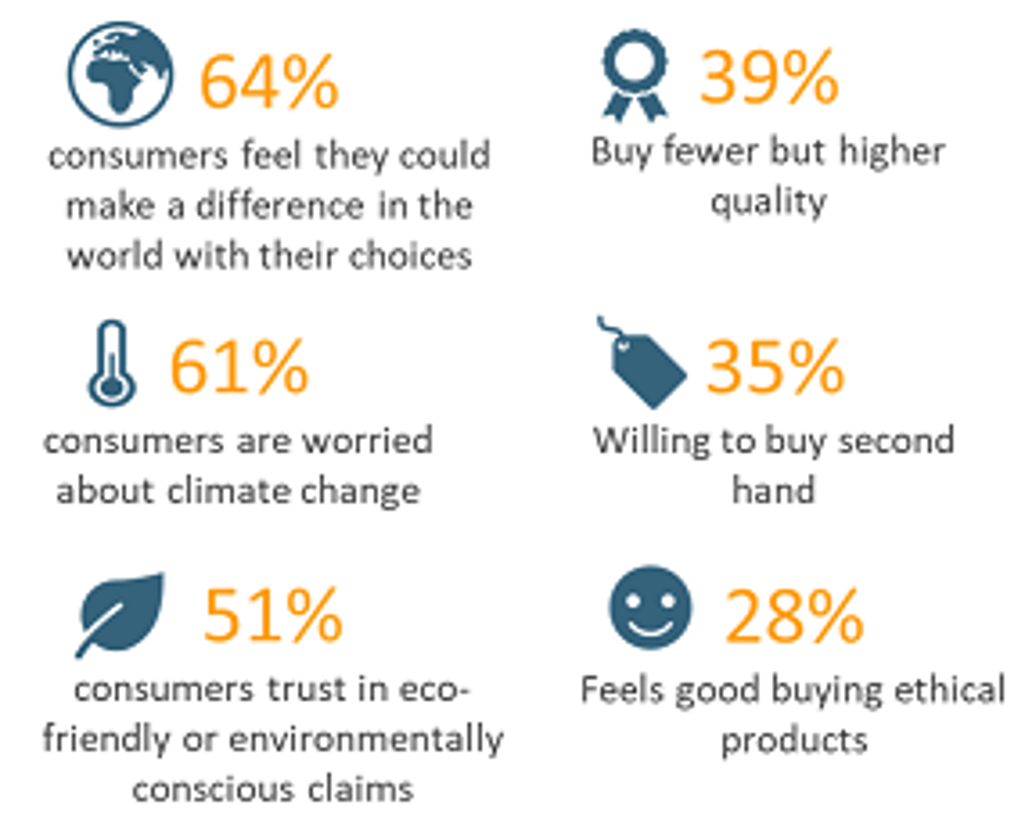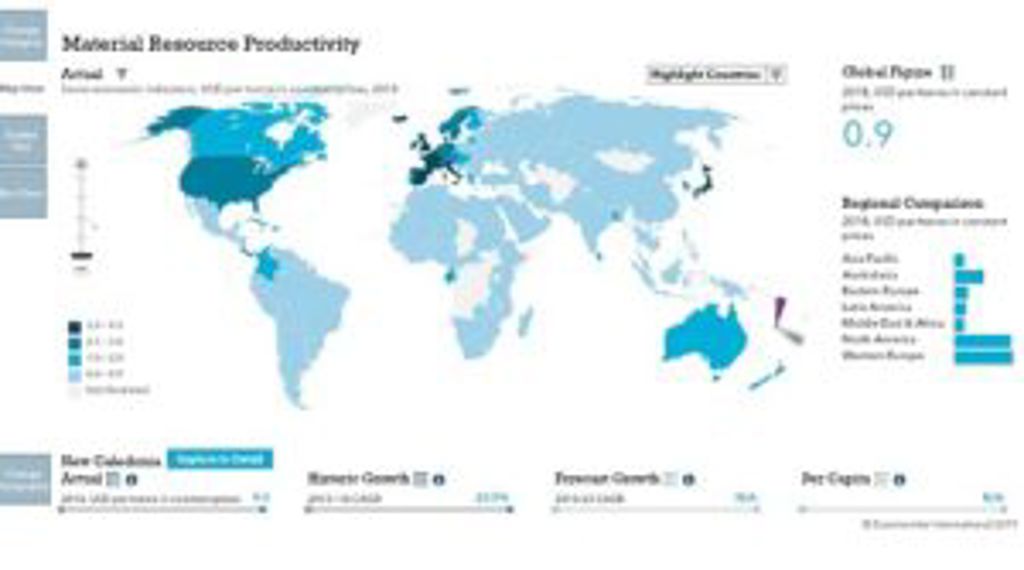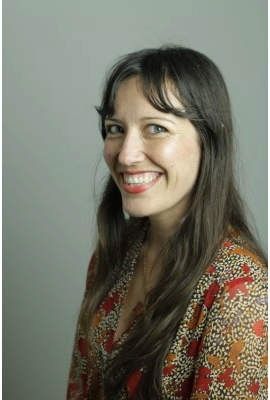Global attention on sustainability has skyrocketed over the last five years, in line with the growing pressures on natural resources and climate change combined with an increase in conscious consumption and ethical living. There are three key sustainability trends that are reshaping businesses across all industries, with implications for all players across the value chain, from raw materials and product manufacturers to logistics companies and retailers. Businesses that embrace ethical living, the circular economy and sustainable packaging will make headways in enhancing their brand image and reputation and winning over more ethical and demanding consumers.
Ethical living driving sustainable innovation
With 61% of consumers worried about climate change, 64% feel that they can actually make a difference in the world with their purchases and 51% trusting in environmental claims (Euromonitor Lifestyles survey 2019), Ethical Living (being mindful when making life decisions) is one of Euromonitor’s eight megatrends.
Global Consumers: Green Attitudes

Source: Euromonitor International from Lifestyles Survey 2019
However, there is a gap between consumers’ willingness to minimise their impact on the environment and the actual purchasing decision, as they still rank efficacy, value and aesthetics as key desired properties. The higher price of ethical products, along with the lack of transparency and traceability across the supply chain, prevents consumers from making more ethical decisions. Understanding where products come from, and how materials were sourced, transported, and manufactured, could make a difference in the willingness to pay more for ethical products. Early adoption of novel technology to track supply chains offers a huge opportunity for companies with strong sustainability commitments:
With the rising number of ethical consumers demanding transparency, in 2019 Starbucks launched an App that allows consumers to track their coffee from bean to cup;
Marks and Spencer (M&S) has developed an interactive supply chain map with sustainability information on the capture or farming methods for every fishery or farm. This lists the locations of all M&S supplier factories, the farmers that produce the beef and dairy and details of where the company’s wool comes from.
Business opportunities for circular disruption
Overconsumption and poor resource efficiency are damaging natural ecosystems causing biodiversity loss and the depletion of basic resources. The circular economy is the new model for sustainable growth where nothing is wasted, everything is shared, reused, repaired or recycled, aiming to reduce pressure on natural resources, improve supply security and bring economic and social profits. It aims to keep the value of resources for as long as possible and eventually bring them back to the economy at the end of their life, producing zero waste and making cash from waste.
Mapping Materials Resource Productivity, 2018

Source: Euromonitor International from Eurostat
This model is increasingly resonating with Sustainability departments of multinational companies as a possible solution for the waste and resources crises. The truth is that there is no single magic solution able to curve the linear economy in a perfect circle. The combination of new models, technologies, materials and product design is what does have the potential to eventually close the loop.
Consumers are embracing new models that are more environmentally-friendly while also offering high quality and more affordable products that last longer, can be repaired, are easily upgraded or reused. Companies are responding to consumers’ needs and preferences with innovative solutions:
IKEA is embracing the circular economy to address the problems associated with its “fast- furniture” model. With the aim of becoming fully circular, the company is designing longer lasting products and materials using recycled content that can be rented and returned after use;
With 39% of consumers globally preferring to buy fewer products that last longer - as opposed to single-use items - (Euromonitor Lifestyles Survey 2019), in January 2019 the US-based company Terracycle, launched its LOOP circular delivery service, where consumers can buy online products with reusable packaging, such as Herbal Essences shampoo and conditioner in an aluminum bottle, or Haagen-Dazs ice cream and Tide laundry detergent in stainless steel formats.
Sustainable packaging no longer optional
2.2 trillion units are the amount of plastic packaging that was consumed globally in 2018 and just over 60% of it was made of plastic. With 8 million tonnes of plastic ending up in the ocean every year, living ethically with plastic has become a conflict. Governments are launching strategies targeting plastic waste and companies are pledging to make all packaging sustainable by 2030.
There are different types of packaging solutions considered as “more sustainable” by consumers such as recyclable, compostable and biodegradable. According to our Lifestyles Survey (2019), “recycled” is the most trusted green label globally, followed by “locally sourced”, “eco-friendly”, “natural” and “organic”.
The “recyclability” or “composability” of a product highly depends on each country’s collecting and recycling infrastructure. For example, while 52% of municipal solid waste in the USA and 94% in Costa Rica goes to landfill, 50% of the EU’s municipal solid waste is recycled and composted.
Municipal Solid Waste Infrastructure, 2018

Source: Euromonitor International from OECD
With increasing legislation (higher recycling targets, material bans, etc.) businesses need to pioneer the use of suitable packaging alternatives:
Coca-Cola has its “World Without Waste” vision aiming for 100% recyclability by 2030 in 200 countries around the world. To achieve this, Coca-Cola needs to understand the local realities to be able to find realistic solutions for each region. In Europe, the company aims to make all PET bottles with at least 50% recycled content by 2025, supporting well-designed deposit return schemes and partnering with local household collection schemes. However, in Brazil - with poor collection and recycling infrastructure – the company wants 40% of its bottles to be returnable by 2020.
Combining Euromonitor data on industry trends (i.e. packaging) and ethical labels (i.e. sustainable packaging claims) along with data on consumers’ green preferences (lifestyles survey) and environmental pressures and waste infrastructure (natural resources) offers a 360-sustainability solution to help businesses to succeed.
To learn more, download the report Sustainability and New Ways of Doing Things.
